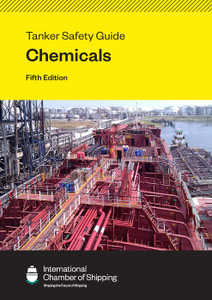
This publication provides guidance on search and recovery procedures for packaged goods lost at sea to which the provisions of chapter VII of SOLAS 1974 and Annex III of MARPOL apply.
This publication summarises the regulations relating to the carriage of dangerous goods in packaged form. It looks at how packaged goods may be lost at sea and the actions to be taken following a loss. Guidance is provided on locating and recovering packages lost at sea, including identification of hazardous goods.
The Manual on Chemical Pollution currently has two sections. Section 1, Problem Assessment and Response Arrangements, was first published in 1987 and revised in 1999. The present publication, Section 2, was prepared by the Marine Environment Protection Committee (MEPC) of the International Maritime Organization (IMO), and provides guidance to Governments on search and recovery procedures for packaged goods lost at sea to which the provisions of chapter VII of SOLAS 1974, as amended, and Annex III of MARPOL, as amended, apply.
Priority should be given to all measures that can reasonably be taken to avoid the loss overboard of packages containing dangerous goods and harmful substances. However, the possibility of such loss can never be totally excluded. Search and Recovery of Packaged Goods Lost at Sea describes the fate of such packages and related options for response, and gives guidelines on how to decide whether the packages should be recovered.
Problems related to oil pollution casualties and related information are specifically addressed in the IMO Manual on Oil Pollution, Sections I to VI.
Expert advice on response to lost packages containing IMDG Code Class 7 (Radioactive material) should be obtained from the International Atomic Energy Agency (IAEA) and reference made to the IAEA Planning and Preparing for Emergency Response to Transport Accidents Involving Radioactive Materials Safety Guide TS-G-1.2.
Chapter 1 – Introduction
Chapter 2 – Summary of regulations and arrangements relating to the carriage of dangerous goods in packaged form
2.1 Principal IMO Conventions
2.2 International Maritime Dangerous Goods Code (IMDG Code)
2.3 Further information on the transport of dangerous goods by sea
2.4 Reporting of movement of packaged dangerous goods
2.5 Reporting loss of packages containing dangerous goods or marine pollutants
Chapter 3 – Loss and fate of packages
3.1 Types of packaged goods
3.2 Circumstances under which packaged goods may be lost at sea
3.3 Fate of lost packaged goods
3.4 Notification and warnings by coastal States
Chapter 4 – Location of packaged goods lost at sea
4.1 Assessing probable location of packaged goods
4.2 Search procedure for floating packaged goods
4.3 Locating packages at the sea surface
4.4 Locating sunken packages
4.5 Locating packages on the shore
Chapter 5 – Identification and hazard assessment
5.1 Factors to be considered
5.2 Marking and labelling of packages and placarding of cargo transport units
5.3 Hazard assessment
5.4 Sources of information on hazards
Chapter 6 – Actions to be taken for the recovery of packaged goods
6.1 Risk assessment of recovery operations
6.2 Inspection of packages
6.3 Methods of package recovery
6.4 Storage and disposal of recovered packages
6.5 Methods of responding to located packages for purposes other than recovery
6.6 Environmental monitoring where packages have leaked or are suspected of leaking
Chapter 7 – Explosives (IMDG Code, class 1)
7.1 Introduction
7.2 Types of explosives
7.3 Hazards
7.4 Accidental recovery
7.5 Response to the reported loss of explosives
Annex – Labels, Marks and Signs
A??s a specialized agency of the United Nations, IMO is the global standard-setting authority for the safety, security and environmental performance of international shipping. Its main role is to create a regulatory framework for the shipping industry that is fair and effective, universally adopted and universally implemented.
In other words, its role is to create a level playing-field so that ship operators cannot address their financial issues by simply cutting corners and compromising on safety, security and environmental performance. This approach also encourages innovation and efficiency.
Shipping is a truly international industry, and it can only operate effectively if the regulations and standards are themselves agreed, adopted and implemented on an international basis. And IMO is the forum at which this process takes place.
- Number of Pages:
- 53
- Published Date:
- January 2007
- Book Height:
- 210 mm
- Book Width:
- 150 mm
- Author:
IMO
- Preview:
- Yes
- ISBN:
- 9789280142228
- Binding Format:
- Paperback
- Publication Date:
- January 2007





